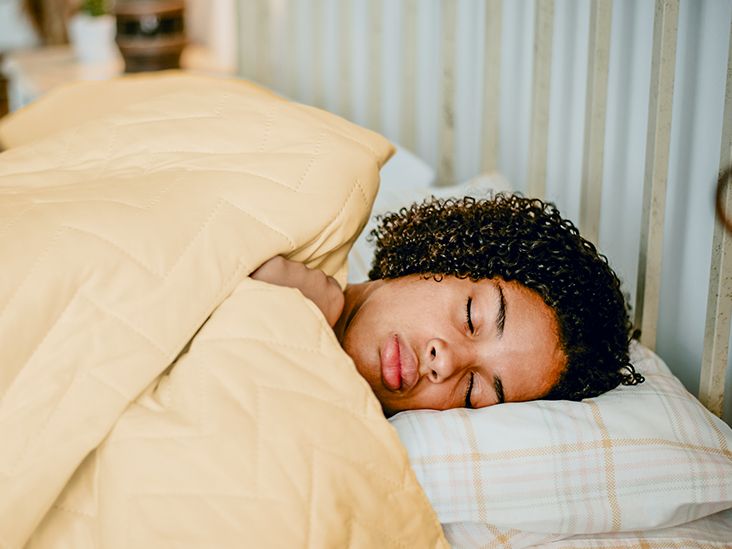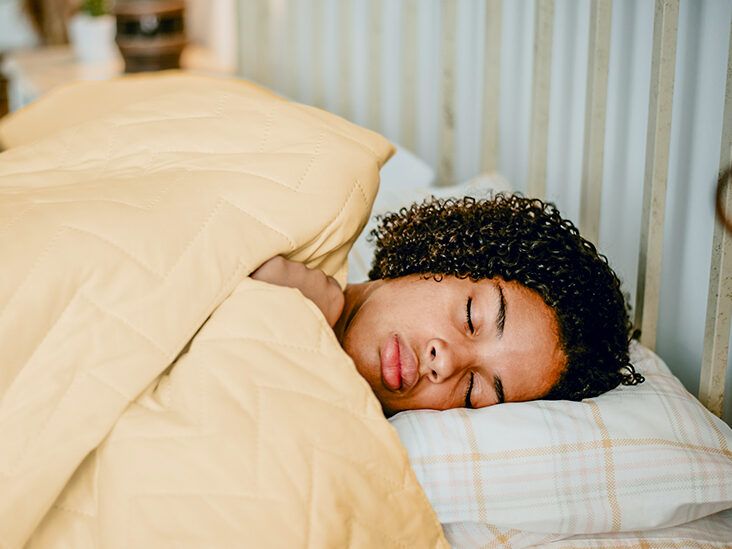The top 10 best ways to fall asleep are: establishing a consistent sleep schedule, limiting caffeine and alcohol intake, creating a comfortable sleep environment, practicing relaxation techniques, avoiding naps, exercising regularly, reducing screen time before bed, using aromatherapy, trying cognitive behavioral therapy, and considering sleep aids as a last resort. Getting a good night’s sleep is crucial for our overall health and well-being.
However, falling asleep can be a struggle for many people. Insomnia, stress, and anxiety are some of the common reasons that disrupt our sleep. We will discuss the top 10 best ways to fall asleep naturally and wake up feeling rested and refreshed.
These tips are easy to follow and can help you establish healthy sleep habits that will benefit your physical and mental health. So, if you’re struggling to fall asleep, keep reading to learn some simple tricks to help you get a good night’s rest.

Credit: www.healthline.com
The Importance Of Quality Sleep
Quality sleep is essential for overall well-being, affecting health and daily performance. Here are some key aspects of the importance of quality sleep:
Health Benefits
Quality sleep promotes physical and mental health, supporting immune function and reducing the risk of chronic diseases.
Impact On Daily Performance
Quality sleep enhances cognitive function, mood stability, and energy levels, leading to improved productivity and focus.

Credit: www.healthline.com
Creating A Sleep-inducing Bedroom Environment
Creating a sleep-inducing bedroom environment is crucial for achieving a restful night’s sleep. Your bedroom should be a sanctuary, designed to promote relaxation and tranquility. By optimizing your bedroom layout and carefully selecting the right mattress and pillow, you can create an environment that promotes deep, rejuvenating sleep.
Optimizing Your Bedroom Layout
Start by decluttering your bedroom to create a peaceful and organized space. Position your bed so that it is the focal point of the room, and ensure there is ample space around it for easy movement. Soft, soothing colors and minimal decor can help create a calming atmosphere. Consider incorporating blackout curtains or blinds to block out any light pollution that may disrupt your sleep.
Choosing The Right Mattress And Pillow
Your mattress and pillow play a crucial role in promoting a good night’s sleep. When choosing a mattress, look for one that provides adequate support for your body and minimizes pressure points. A high-quality pillow that properly supports your head and neck can also make a significant difference. Consider investing in pillows made from memory foam or latex for optimal comfort.
Establishing A Pre-sleep Routine
Creating a consistent pre-sleep routine can significantly improve your ability to fall asleep quickly and enjoy a restful night. By establishing a calming set of activities before bed, you signal to your body that it's time to wind down and prepare for sleep.
Relaxation Techniques
Incorporate relaxation techniques like deep breathing, meditation, or gentle stretching into your pre-sleep routine. These activities help lower stress levels and promote a sense of calmness, making it easier for you to drift off to sleep.
The Role Of A Consistent Schedule
Maintain a consistent sleep schedule by going to bed and waking up at the same time every day, even on weekends. This helps regulate your body's internal clock and improves the quality of your sleep over time.
Dietary Adjustments For Better Sleep
Eating the right foods and avoiding certain items before bedtime can significantly impact the quality of your sleep. Making dietary adjustments for better sleep can be a game-changer in improving your sleep patterns and overall well-being. By incorporating the right foods and eliminating sleep-disrupting items, you can set the stage for a restful night's sleep.
Foods That Promote Sleep
- Cherries: Rich in melatonin, a hormone that regulates sleep-wake cycles.
- Fatty Fish: High in vitamin D and omega-3 fatty acids, promoting serotonin production.
- Bananas: Contain magnesium and potassium, which help relax muscles and nerves.
- Oats: Source of melatonin and complex carbohydrates that aid in the release of serotonin.
- Almonds: Provide magnesium, which has been linked to improving sleep quality.
What To Avoid Before Bedtime
- Caffeine: Stimulates the nervous system and can disrupt sleep patterns.
- Alcohol: While it may initially make you drowsy, it can lead to fragmented sleep.
- Spicy Foods: Can cause heartburn and discomfort, hindering peaceful sleep.
- Sugary Snacks: Cause blood sugar fluctuations, leading to wakefulness during the night.
- High-Fat Meals: Digestion of fatty foods can interfere with sleep quality.
Mindfulness And Meditation
When it comes to improving sleep quality, mindfulness and meditation can be powerful tools. By calming the mind and relaxing the body, these practices help to promote deep, restful sleep. Here are some effective ways to incorporate mindfulness and meditation into your bedtime routine.
Breathing Exercises
Breathing exercises are a simple yet effective way to calm the mind and prepare the body for sleep. By focusing on deep, slow breaths, you can activate the body's relaxation response, reducing stress and anxiety. Try this basic breathing exercise: Inhale deeply for a count of four, hold for a count of four, then exhale slowly for a count of six. Repeat several times to promote relaxation.
Guided Meditation Apps
Guided meditation apps offer a convenient way to access a variety of meditation practices designed specifically for sleep. These apps provide guided sessions led by experienced instructors, allowing you to easily incorporate meditation into your nightly routine. Some popular options include Headspace, Calm, and Insight Timer, which offer a range of guided meditations tailored to promote relaxation and better sleep.
Physical Activity And Its Impact On Sleep
Physical activity plays a crucial role in improving the quality of sleep. Engaging in regular exercise not only promotes physical health but also has a significant impact on regulating sleep patterns. By understanding the best time to exercise and incorporating gentle exercises for relaxation into your routine, you can effectively enhance your ability to fall asleep and enjoy a restful night.
Best Time To Exercise
Exercising in the morning or afternoon can help regulate your circadian rhythm, making it easier to fall asleep at night. Avoid vigorous exercise close to bedtime, as it can stimulate your body and lead to difficulty in falling asleep.
Gentle Exercises For Relaxation
Incorporating yoga, stretching, or tai chi into your evening routine can help relax your body and mind, promoting a calm state conducive to falling asleep. These gentle exercises can release tension and prepare your body for a restful night's sleep.
Technological Distractions And Sleep Hygiene
Technological Distractions and Sleep Hygiene: In today's digital age, technological distractions can significantly hinder our ability to fall asleep. Excessive screen time, especially before bedtime, can disrupt our sleep patterns and lead to insomnia. It's essential to understand the impact of technology on our sleep and implement effective sleep hygiene practices to ensure a restful night's sleep.
Blue Light And Its Effects
Blue light emitted by electronic devices such as smartphones, tablets, and computers can interfere with the body's natural sleep-wake cycle. Exposure to blue light suppresses the production of melatonin, the hormone responsible for regulating sleep. To mitigate the effects of blue light, consider using blue light filter apps or glasses to reduce exposure in the evening.
Digital Detox Strategies
Implementing a digital detox routine can help improve sleep hygiene. Consider establishing a screen curfew at least an hour before bedtime to allow your mind to unwind. Engage in relaxing activities such as reading a book, practicing meditation, or taking a warm bath to promote a restful state of mind before sleep.
Natural Sleep Aids And Supplements
Natural sleep aids and supplements are effective alternatives for achieving a restful night's sleep. Incorporating herbal teas, magnesium, and melatonin into your bedtime routine can promote relaxation and help you drift off peacefully.
Herbal Teas
Herbal teas such as chamomile and valerian root have calming properties that can induce sleep naturally. Consuming a warm cup of herbal tea before bed can signal to your body that it's time to unwind and prepare for rest.
Magnesium And Melatonin
Magnesium is a mineral that plays a crucial role in regulating neurotransmitters involved in sleep. By incorporating magnesium-rich foods or supplements into your diet, you can support a healthy sleep cycle. Melatonin is a hormone that helps control your sleep-wake cycle. Taking a melatonin supplement can signal to your body that it's time to sleep, aiding in falling asleep faster.
The Power Of Napping
When it comes to improving your sleep quality, harnessing the power of napping can be a game-changer. A well-timed nap can enhance alertness, mood, and overall cognitive performance. Here’s how you can make the most out of napping to promote better sleep:
Nap Duration And Timing
Nap duration and timing play a crucial role in reaping the benefits of a nap. A short power nap of 10 to 20 minutes can provide a quick boost of alertness without leaving you feeling groggy. Longer naps of 60 to 90 minutes can include a full sleep cycle, leading to enhanced memory and creativity. It's best to schedule naps earlier in the afternoon to avoid interfering with nighttime sleep.
Avoiding Disruption To Nighttime Sleep
Avoiding disruption to nighttime sleep is essential when incorporating naps into your routine. Limiting the duration and avoiding napping too close to bedtime can prevent interference with your regular sleep schedule. By keeping naps brief and scheduling them strategically, you can enjoy the benefits of napping without sacrificing your nighttime rest.
When To Seek Professional Help
If you experience persistent difficulty falling asleep, it may be time to consult a sleep specialist. Seeking professional help can provide valuable insights and solutions to improve your sleep quality.
Signs Of Sleep Disorders
- Consistent inability to fall asleep
- Frequent waking during the night
- Excessive daytime fatigue
- Unrefreshing sleep despite adequate hours
Types Of Sleep Specialists
There are different types of sleep specialists who can help diagnose and treat sleep disorders:
| Specialist | Description |
|---|---|
| Polysomnographer | Conducts sleep studies to diagnose disorders |
| Neurologist | Specializes in brain and nervous system disorders |
| Psychiatrist | Addresses mental health aspects affecting sleep |
Consulting these sleep specialists can help identify underlying issues and develop a tailored treatment plan for better sleep.

Credit: www.healthline.com
Conclusion
Having trouble falling asleep? Try these top 10 methods for a restful night. From creating a bedtime routine to using relaxation techniques, there's a solution for everyone. Remember, a good night's sleep is crucial for overall health and well-being. Sweet dreams await with these helpful tips!
